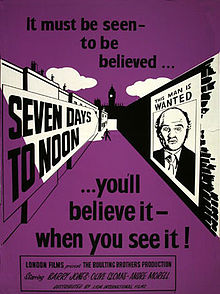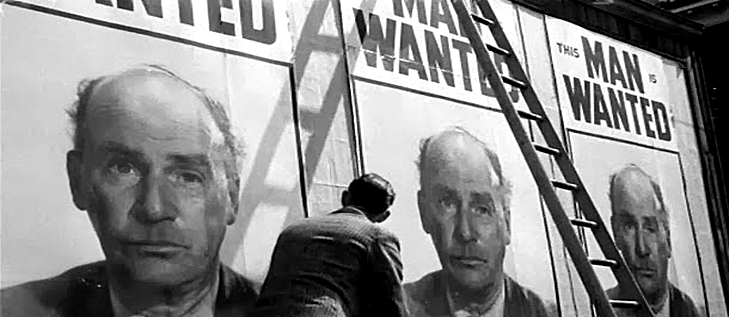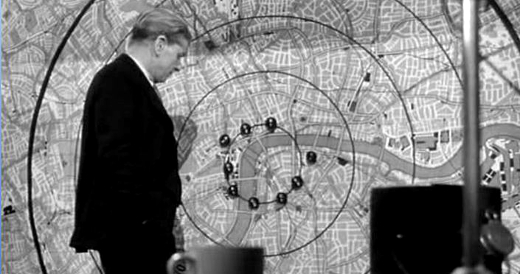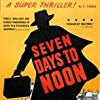Seven Days to Noon (1950)
IMDb meta-data is 1 hour and 34 minutes, rated 7.1/10.0 by 1290 cinematizens.
Genre: Atomic.

Verdict: Compelling.
Dr Memory has a crisis of conscience about what god hath wrought and writes a letter to the PM threatening a surface nuclear test in Westminster. Amid the flotsam of nut case threats that flow into the PM’s office, a routine investigation follows, led by the brisk, decisive, and focussed Quatermass. Don’t blink and there is a gangly Joss Ackland, cocking his head, in one scene.

The staging is marvellous and the tragi-comic woman with whom Mr Memory shacks up is a humane touch. He threatens Armageddon; she fusses over her cavalier terrier dog. Earlier the boarding house owner wrangles a herd of cats. These snippets of ordinary life relieve much of the tension; although they do not give Memory pause, they do give the viewer perspective. Then there are the sight gags, the man in the sandwich boards trying repeatedly to board a train, or the Tommie rifling clothes.
Such detached subtlety is a million miles from the grind-it-in-their-faces approach of Hollywood these days.
In this work of fiction the representatives of the media are presented as sober and responsible, rather than first fomenting hysteria, then trading on it, and finally denouncing the hysteria and panic they do so much to cause. More fiction: The political leadership is calm and the army disciplined (almost). Where are the McKinsey managers in all this, history will ask.
But Memory’s moral crisis is not developed. None of the others give it a moment’s thought. Yet Robert Oppenheimer and Andrei Sakharov were just two of many atomic scientists at the time who did worry about the world they had made. Biographies of both these scientists are discussed elsewhere on this blog. Get clicking. The film was released in July 1951 when the Cold War was hot in Korea and tense in Berlin.

The film is all the more focussed for not having big name stars in it to distract attention from the story. Unlike Dunkirk (2017) there is no Kenneth Branagh of the day taking off his hat and putting it back on again and again to steal scenes. Does he really need to do that? Evidently, yes.
The Boutling Brothers performed magic in this film. The crowd scenes, the evacuation, the military patrols, the empty streets, the reflection in the widow, Paddington Station, all touches of a master like Hitchcock done on a pittance. They have a long string of well known and much loved films to their credit, e.g., The Outsider (1948), Private’s Progress (1956), The Risk (1956), I’m All Right, Jack (1959), and Heavens Above! (1963) in which they ridiculed sacrosanct institutions like church, social class, army, and state, and in others in which moral dilemmas were front and centre without any preaching. Among the actors they repeatedly cast was Victor Madden who does his nervous twitch on command first in the pub and then outside the church.

